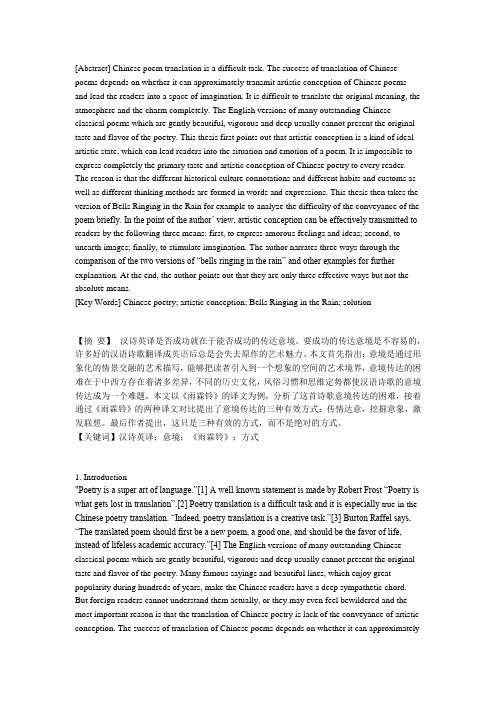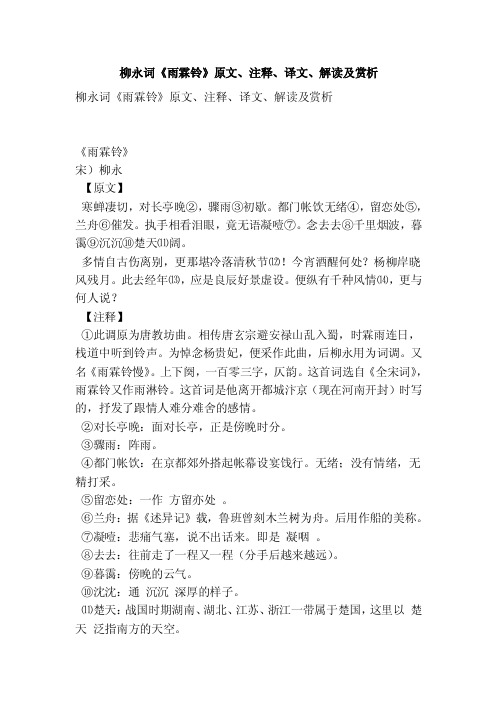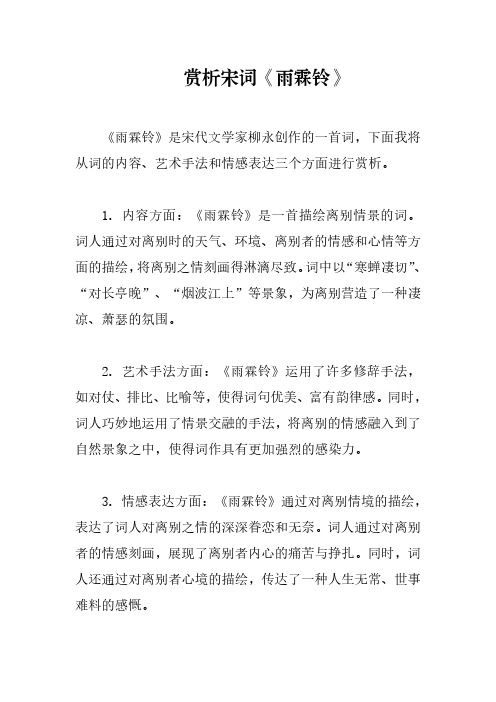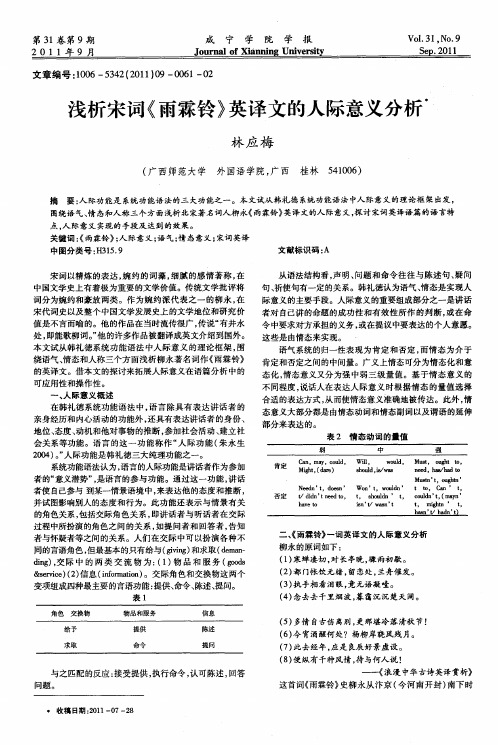宋词《雨霖铃》英文翻译
《雨霖铃》三种英译本之比较

语言应用研究
《雨霖铃》三种英译本之比较
□邓 颖 郭 勇
摘 要:《雨霖铃》是北宋婉约派代表诗人柳永描写离愁别绪的代表作。词中通过树立典型物象,营造了凄美的意 境,表达了作者对离别的伤感和生活的无奈。本文选取许渊冲、杨宪益和龚景浩的英译本对词牌名的翻译、文化意象词的 翻译和具体词句的翻译进行对比分析。
关键词:雨霖铃 词牌名 文化意象
一、《雨霖铃》三个英译本对比分析 《雨霖铃》是柳永从汴京(今河南开封)南下,与恋 人惜别之作,在倾吐离愁的同时,也抒发了对自身遭遇的 感概。该词原文如下: 寒蝉凄切,对长亭晚,骤雨初歇。都门帐饮无绪,留 恋处、兰舟催发。执手相看泪眼,竟无语凝噎。念去去, 千里烟波,暮霭沉沉楚天阔。 多情自古伤离别,更那堪、冷落清秋节!今宵酒醒何 处?杨柳岸、晓风残月。此去经年,应是良辰好景虚设。 便纵有千种风情,更与何人说。 词作为中国文学体裁中的韵文文体之一,本来是为配 乐歌唱而作的诗,每首词都应该有或曾有过一个乐谱。中 国古代的乐谱都属于某种宫调(宫、商、角、徵、羽五音 即声律),配词而歌就成了词调,每个词调古人都赋予其 一个名称,这个名称就叫词牌。 “词牌名”代表的是一首词的旋律,是作者填词时用 来标明依据何种曲谱而填词的一种名称,与词的内容没有 意义上的关联。词牌名的翻译,要考虑其神韵和美感,还 需考虑其历史来源。目前国内外常见的词牌名英译方法有 零译法、音译法、直译法和意译法。 “雨霖铃”这个词牌名记载了唐玄宗和杨贵妃的爱 情。杨贵妃死后,唐玄宗悲痛万分,听着窗外的雨中铃儿 叮当响,心怀无尽的思念,创作了“雨霖铃”。因此,这 个词牌名本身就有着文化内涵,代表着情人之间分离时的
《雨霖铃》的英译

[Abstract] Chinese poem translation is a difficult task. The success of translation of Chinese poems depends on whether it can approximately transmit artistic conception of Chinese poems and lead the readers into a space of imagination. It is difficult to translate the original meaning, the atmosphere and the charm completely. The English versions of many outstanding Chinese classical poems which are gently beautiful, vigorous and deep usually cannot present the original taste and flavor of the poetry. This thesis first points out that artistic conception is a kind of ideal artistic state, which can lead readers into the situation and emotion of a poem. It is impossible to express completely the primary taste and artistic conception of Chinese poetry to every reader. The reason is that the different historical culture connotations and different habits and customs as well as different thinking methods are formed in words and expressions. This thesis then takes the version of Bells Ringing in the Rain for example to analyze the difficulty of the conveyance of the poem briefly. In the point of the author‟ view, artistic conception can be effectively transmitted to readers by the following three means: first, to express amorous feelings and ideas; second, to unearth images; finally, to stimulate imagination. The author narrates three ways through the comparison of the two versions of “bells ringing in the rain” and other examples for further explanation. At the end, the author points out that they are only three effective ways but not the absolute means.[Key Words] Chinese poetry; artistic conception; Bells Ringing in the Rain; solution【摘要】汉诗英译是否成功就在于能否成功的传达意境。
雨霖铃原文及翻译注释

雨霖铃原文及翻译注释雨霖铃原文及翻译注释《雨霖铃》作品介绍《雨霖铃》(寒蝉凄切)是宋代词人柳永的作品。
此词上片细腻刻画了情人离别的嘲,抒发离情别绪;下片着重摹写想象中别后的凄楚情状。
全词遣词造句不着痕迹,绘景直白自然,场面栩栩如生,起承转合优雅从容,情景交融,蕴藉深沉,将情人惜别时的真情实感表达得缠绵悱恻,凄婉动人,堪称抒写别情的千古名篇,也是柳词和婉约词的代表作。
《雨霖铃》词牌来源马嵬兵变后,杨贵妃缢死,在平定叛乱之后,玄宗北还,一路细雨沥沥,风雨吹打在皇銮的金铃上,玄宗因悼念杨贵妃而作此曲。
《碧鸡漫志》卷五引《明皇杂录》及《杨妃外传》云:“明皇既幸蜀,西南行,初入斜谷,霖雨弥旬,于栈道雨中闻铃,音与山相应。
上既悼念贵妃,采其声为《雨霖铃》曲,以寄恨焉。
时梨园弟子惟张野狐一人,善筚篥,因吹之,遂传于世。
”这也就是词牌《雨霖铃》的由来。
《雨霖铃》原文雨霖铃寒蝉凄切⑴,对长亭晚,骤雨初歇⑵。
都门帐饮无绪⑶,留恋处,兰舟催发⑷。
执手相看泪眼,竟无语凝噎⑸。
念去去⑹,千里烟波,暮霭沉沉楚天阔⑺。
多情自古伤离别,更那堪冷落清秋节!今宵酒醒何处⑻?杨柳岸,晓风残月。
此去经年⑼,应是良辰好景虚设。
便纵有千种风情⑽,更与何人说?《雨霖铃》注释①长亭:古代在交通要道边每隔十里修建一座长亭供行人休息,又称“十里长亭”。
靠近城市的长亭往往是古人送别的地方。
②凄切:凄凉急促。
③骤雨:急猛的阵雨。
④都门:国都之门。
这里代指北宋的首都汴京(今河南开封)。
⑤帐饮:在郊外设帐饯行。
⑥无绪:没有情绪。
⑦兰舟:古代传说鲁班曾刻木兰树为舟(南朝梁任昉《述异记》。
这里用做对船的美称。
⑧凝噎:喉咙哽塞,欲语不出的样子。
⑨去去:重复“去”字,表示行程遥远。
⑩暮霭:傍晚的云雾。
沈沈:即“沉沉”,深厚的样子。
楚天:指南方楚地的天空。
暮霭沈沈(沉沉)楚天阔:傍晚的云雾笼罩着南天,深厚广阔,不知尽头。
今宵:今夜。
经年:年复一年。
纵:即使。
风情:情意。
柳永词《雨霖铃》原文、注释、译文、解读及赏析

柳永词《雨霖铃》原文、注释、译文、解读及赏析柳永词《雨霖铃》原文、注释、译文、解读及赏析《雨霖铃》宋)柳永【原文】寒蝉凄切,对长亭晚②,骤雨③初歇。
都门帐饮无绪④,留恋处⑤,兰舟⑥催发。
执手相看泪眼,竟无语凝噎⑦。
念去去⑧千里烟波,暮霭⑨沉沉⑩楚天⑾阔。
多情自古伤离别,更那堪冷落清秋节⑿!今宵酒醒何处?杨柳岸晓风残月。
此去经年⒀,应是良辰好景虚设。
便纵有千种风情⒁,更与何人说?【注释】①此调原为唐教坊曲。
相传唐玄宗避安禄山乱入蜀,时霖雨连日,栈道中听到铃声。
为悼念杨贵妃,便采作此曲,后柳永用为词调。
又名《雨霖铃慢》。
上下阕,一百零三字,仄韵。
这首词选自《全宋词》,雨霖铃又作雨淋铃。
这首词是他离开都城汴京(现在河南开封)时写的,抒发了跟情人难分难舍的感情。
②对长亭晚:面对长亭,正是傍晚时分。
③骤雨:阵雨。
④都门帐饮:在京都郊外搭起帐幕设宴饯行。
无绪;没有情绪,无精打采。
⑤留恋处:一作方留亦处。
⑥兰舟:据《述异记》载,鲁班曾刻木兰树为舟。
后用作船的美称。
⑦凝噎:悲痛气塞,说不出话来。
即是凝咽。
⑧去去:往前走了一程又一程(分手后越来越远)。
⑨暮霭:傍晚的云气。
⑩沈沈:通沉沉深厚的样子。
⑾楚天:战国时期湖南、湖北、江苏、浙江一带属于楚国,这里以楚天泛指南方的天空。
⑿清秋节:萧瑟冷落的秋季。
⒀经年:经过一年或多年,此指年复一年。
⒁风情:情意(男女恋情)。
【译文】秋后的蝉叫得是那样地凄凉而急促,面对着长亭,正是傍晚时分,一阵急雨刚停住。
在京都城外设帐饯别,却没有畅饮的心绪,正在依依不舍的时候,船上的人已催着出发。
握着手互相瞧着,满眼泪花,直到最后也无言相对,千言万语都噎在喉间说不出来。
想到这回去南方,这一程又一程,千里迢迢,一片烟波,那夜雾沉沉的楚地天空竟是一望无边。
自古以来多情的人最伤心的是离别,更何况又逢这萧瑟冷落的秋季,这离愁哪能经受得了!谁知我今夜酒醒时身在何处?怕是只有杨柳岸边,面对凄厉的晨风和黎明的残月了。
赏析宋词《雨霖铃》

赏析宋词《雨霖铃》
《雨霖铃》是宋代文学家柳永创作的一首词,下面我将从词的内容、艺术手法和情感表达三个方面进行赏析。
1.内容方面:《雨霖铃》是一首描绘离别情景的词。
词人通过对离别时的天气、环境、离别者的情感和心情等方面的描绘,将离别之情刻画得淋漓尽致。
词中以“寒蝉凄切”、“对长亭晚”、“烟波江上”等景象,为离别营造了一种凄凉、萧瑟的氛围。
2.艺术手法方面:《雨霖铃》运用了许多修辞手法,如对仗、排比、比喻等,使得词句优美、富有韵律感。
同时,词人巧妙地运用了情景交融的手法,将离别的情感融入到了自然景象之中,使得词作具有更加强烈的感染力。
3.情感表达方面:《雨霖铃》通过对离别情境的描绘,表达了词人对离别之情的深深眷恋和无奈。
词人通过对离别者的情感刻画,展现了离别者内心的痛苦与挣扎。
同时,词人还通过对离别者心境的描绘,传达了一种人生无常、世事难料的感慨。
总的来说,《雨霖铃》是一首描绘离别之情的杰作,词人通过对离别情境的描绘,展现了离别者内心的痛苦与无奈,同时传达了一种人生无常、世事难料的感慨。
这首词在艺术手法和情感表达方面都具有很高的艺术价值,值得我们深入品味和欣赏。
《雨霖铃》三种英译本之比较

《雨霖铃》三种英译本之比较作者:邓颖郭勇来源:《现代语文(语言研究)》2017年第11期摘要:《雨霖铃》是北宋婉约派代表诗人柳永描写离愁别绪的代表作。
词中通过树立典型物象,营造了凄美的意境,表达了作者对离别的伤感和生活的无奈。
本文选取许渊冲、杨宪益和龚景浩的英译本对词牌名的翻译、文化意象词的翻译和具体词句的翻译进行对比分析。
关键词:雨霖铃词牌名文化意象柳永是第一位对宋词进行全面革新的词人,也是两宋词坛上创作词调最多的词人。
柳永大力创作慢词,将敷陈其事的赋法移植于词,同时充分运用俚词俗语,适俗的意象、淋漓尽致的铺叙、平淡无华的白描等独特的艺术手法,对宋词的发展产生了深远影响。
其代表作《雨霖铃》是抒写离情别绪的千古名篇,词人用悲秋景色来衬托,将惜别的真情实感表达得缠绵悱恻、凄婉动人。
本文选取翻译家许渊冲、杨宪益和龚景浩的英译本进行对比分析。
一、《雨霖铃》三个英译本对比分析《雨霖铃》是柳永从汴京(今河南开封)南下,与恋人惜别之作,在倾吐离愁的同时,也抒发了对自身遭遇的感概。
该词原文如下:寒蝉凄切,对长亭晚,骤雨初歇。
都门帐饮无绪,留恋处、兰舟催发。
执手相看泪眼,竟无语凝噎。
念去去,千里烟波,暮霭沉沉楚天阔。
多情自古伤离别,更那堪、冷落清秋节!今宵酒醒何处?杨柳岸、晓风残月。
此去经年,应是良辰好景虚设。
便纵有千种风情,更与何人说。
词作为中国文学体裁中的韵文文体之一,本来是为配乐歌唱而作的诗,每首词都应该有或曾有过一个乐谱。
中国古代的乐谱都属于某种宫调(宫、商、角、徵、羽五音即声律),配词而歌就成了词调,每个词调古人都赋予其一个名称,这个名称就叫词牌。
“词牌名”代表的是一首词的旋律,是作者填词时用来标明依据何种曲谱而填词的一种名称,与词的内容没有意义上的关联。
词牌名的翻译,要考虑其神韵和美感,还需考虑其历史来源。
目前国内外常见的词牌名英译方法有零译法、音译法、直译法和意译法。
“雨霖铃”这个词牌名记载了唐玄宗和杨贵妃的爱情。
浅析宋词《雨霖铃》英译文的人际意义分析

句、 祈使句有一定的关系。韩 礼德认 为语气 、 情态是 实现人 际意义的主要手段 。人 际意义的重要组成部分 之一是讲话
者对 自己讲的命题的成功性和有效性所作的判断, 或在命
令 中要求对方承担的义务 , 或在提议 中要表达 的个人 意愿。 这些是 由情态来实现。 语气系统的归一性 表现 为肯定 和否 定 , 而情态 为介于 肯定和否定之间的中间量。广义上情态可分为情态化和意 态化 , 情态 意义 又分 为强 中弱 三级 量值 。基 于情态 意义 的 不同程度 , 说话人在表达 人际 意义时根 据情态 的量 值选择
中国文学史上有着极为重 要的文学价值 。传统文学批 评将 词分为婉约和豪放 两类 。作 为婉 约派代 表 之一 的柳 永 , 在 宋代词史 以及整个 中国文 学发展史上 的文学地位 和研 究价 值是不言而喻 的。他 的作 品在 当时流传很广 , 传说“ 有井水 处, 即能歌柳词 。 他的许多作 品被翻译成 英文介绍到国外 。 ” 本文试从韩礼德 系统功 能语法 中人 际意义 的理论 框架 , 围 绕语气 、 态和人称三个方 面浅析柳 永著 名词作 《 情 雨霖 铃》 的英译文 。借本文 的探讨来拓展人 际意义在语篇 分析 中的 可应用性和操作 性。
浅析宋词 《 雨霖铃 》 英译 文的人际意义分析
林 应 梅
( 西 师 范大学 外 国语 学院 , 西 广 广
摘
桂林
5 10 ) 406
要 : 际功能是 系统功能语 法的三 大功能之 一。本文试从韩礼德 系统功能语法 中人际意义 的理论 框架 出发 , 人
围绕语气、 态和人 称三个方 面浅析 北宋著 名词人柳 永《 霖铃》 情 雨 英译文的人 际意义 , 宋词英译语篇的语言特 探讨
柳永《雨霖铃·寒蝉凄切》英文翻译

柳永《雨霖铃·寒蝉凄切》英文翻译柳永《雨霖铃·寒蝉凄切》英文翻译《雨霖铃·寒蝉凄切》是宋代词人柳永的一首词作。
下面是我们为大家带来柳永《雨霖铃·寒蝉凄切》英文翻译,欢迎大家阅读。
柳永《雨霖铃》寒蝉凄切,对长亭晚,骤雨初歇。
都门帐饮无绪,留恋处,兰舟催发。
执手相看泪眼,竟无语凝噎。
念去去、千里烟波,暮霭沉沉楚天阔。
多情自古伤离别,更那堪,冷落清秋节!今宵酒醒何处?杨柳岸、晓风残月。
此去经年,应是良辰好景虚设。
便纵有千种风情,更与何人说?英文翻译Cicadas Chill, Shrill(To the Tune of Yulinling)Liu YongCicadas screech chill,shrill, after a sudden shower.By the roadside pavilionin the evening, we are partingoutside the city gate, no moodfor the farewell drink, no strengthto tear ourselves apart, whenthe magnolia boat urges me to board.We gaze into each other’s eyesin tears, hand holdinghand, all our words choked.I’m sailing out, for thousands of milesalong the mist-enveloped waves,the somber dusk hazedeepening against the boundless southern sky.It’s been hard for lovers to partsince time immemorial.How much more soat this cold, deserted autumn!Tonight, where shall I findmyself, waking from a hangover —against the riverbank lined with weeping willowsthe moon sinking, and the dawn risingon a breeze? Yearafter year, I will be far away from you.All these beautiful scenes are unfolding,but to no avail.Oh, to whom can I speakof this ineffably enchanting landscape?拓展阅读:柳永《雨霖铃》赏析词的上片写临别时的情景,下片主要写别后情景。
- 1、下载文档前请自行甄别文档内容的完整性,平台不提供额外的编辑、内容补充、找答案等附加服务。
- 2、"仅部分预览"的文档,不可在线预览部分如存在完整性等问题,可反馈申请退款(可完整预览的文档不适用该条件!)。
- 3、如文档侵犯您的权益,请联系客服反馈,我们会尽快为您处理(人工客服工作时间:9:00-18:30)。
Yu Lin Ling
Liu Yong
(丁祖馨 译)
Cicadas trill sad songs.At the post pavilion, The evening shower stops; We're saying goodbye, at this wayside stall. Who wants to drink, here at the Capital gate? The boatman's in a hurry, he calls,But we can't tear ourselves away. We stare, in tears, hand in hand, Struggling in vain to say what words we've got. Knowing how far south I'm to go,To drift along in the southern climate, Under the cloudy sky at dusk. Oh, the heartache! Lovers always weep, saying goodbye—And today is autumn, and, cold. When the wine finally leaves me sober, Where will I be? Along a river bank Lined with willows—in a morning breeze—Under a sinking moon. But our farewell is for a long time, And without you Beauty and happiness both will be wasted on me. Even when I have heartloads of love Who, oh who can I tell about it?
Falling Rain
Liu Yong
( YK Kwan 译)
While cicadas were making a thrilling rattle, We’re at the pavilion in late evening hour. During a break in the sudden shower, We improvised with a drink in the portal. But my mind was all blank. As I indulged to linger on, The boatman said it was time to be gone. We held each other’s hand And gazed with our eyes as tears ran. Silent and tongue-tied, All words failed us then. I figured out what ahead lies: It’s going to be evening haze, Over a thousand miles of waves, Under a southern sky, Overcast; and stretching wide. Sorrow in losing a friend, Is what a romantic heart will bring. Especially with Autumn Festival at hand. After tonight’s drink, When I’m sober again, Where shall I be? Willows lining the riverbank, Shall see me, Under a twilight moon, in the morning breeze. As for the years to come, any festive day, Shall be worthless to celebrate. Even there’re loads of feelings in my mind, But to whom can I confide!
Yu Lin Ling
Liu Yong
(裘小龙 译)
Cicadas screech chill, shrill, after a sudden shower. By the roadside pavilion in the evening, we are parting outside the city gate, no mood for the farewell drink, no strength to tear ourselves apart , when the magnolia boat urges me to board. We gaze into each other's eyes in tears, hand holding hand, all our words choked. I'm sailing out, for thousands of miles along the mist-enveloped waves, the somber dusk haze deepening against the boundless southern sky. It's been hard for lovers to part since time immemorial. How much more so at this cold, deserted autumn! Tonight, where shall I find myself, waking from a hangover — against the riverbank lined with weeping willows the moon sinking, and the dawn rising on a breeze? Year after year, I will be far away from you. All these beautiful scenes are unfolding, but to no avail. Oh, to whom can I speak of this ineffably enchanting landscape?
宋词中译英赏析
By—— 04120204 孙霞 04120206 朱程璇 04120208 张梦洁
目录
1 2 3 4
宋词——《 雨霖铃 》柳永 多种英文版翻译 最好的一种英文翻译及点评 《 雨霖铃 》 中文含义赏析
《 雨霖铃 》
柳永
寒蝉凄切,对长亭晚,骤雨初歇。 都门帐饮无绪,留恋处,兰舟摧发。 执手相看泪眼,竟无语凝噎。 念去去千里烟波,暮霭沈沈楚天阔。 多情自古伤离别,更那堪冷落清秋节。 今宵酒醒何处, 杨柳岸、晚风残月。 此去经年,应是良辰好景虚设。 便 纵有千种风情,更与何人说?
Farewell in Autumn
未知名者译
The humming from shivering cicadas dies down, behind the farewell pavilion goes the fading sun, Intermittent showers go and come. As the doleful drinking goes on, the boat signals the departure sound, not willing to part, we linger on. Hand in hand we gaze into each other's teary eyes, breaking the silence comes a smothered cry. The waterway ahead meanders a thousand miles, stretching into the cloud under the dimming sky. With deep love it hurts to say goodbye, especially in a cold and deserted autumn night. Where will the boat carry me, after I wake up from the sober sleep? A river bank lined with willow trees, under the crescent moon comes morning breeze. Without you, I enjoy not splendid vistas like this, to whom I confess, my feelings and emotions nevertheless?
Yu Lin Ling
Liu Yong
(杨宪益、戴乃迭 译)
Mournfully chirr the cicadas, As the shower of rain stops And wt dusk. We drink without cheer in the tent outside the city gate; It is the moment we are loath to part But the magnolia-wood boat beckons me on. Hands clasped together we see our tears, So overcome, unable to utter a single word. Ahead lies a journey a thousand li of misty waves And the vast sky of Chu hangs with heavy evening haze. Since time immemorial, lovers have grieved at parting Made more poignant in the fallow season of autumn. What is this place where I have sobered from my drunken stupor? "The riverside is strewn with willow trees, The morning breeze wafts in with a waning moon." Our parting will last for years, Fine hours and scenes of beauty have no appeal Even though my heart is filled with tender feelings, But, with whom can I share them?
